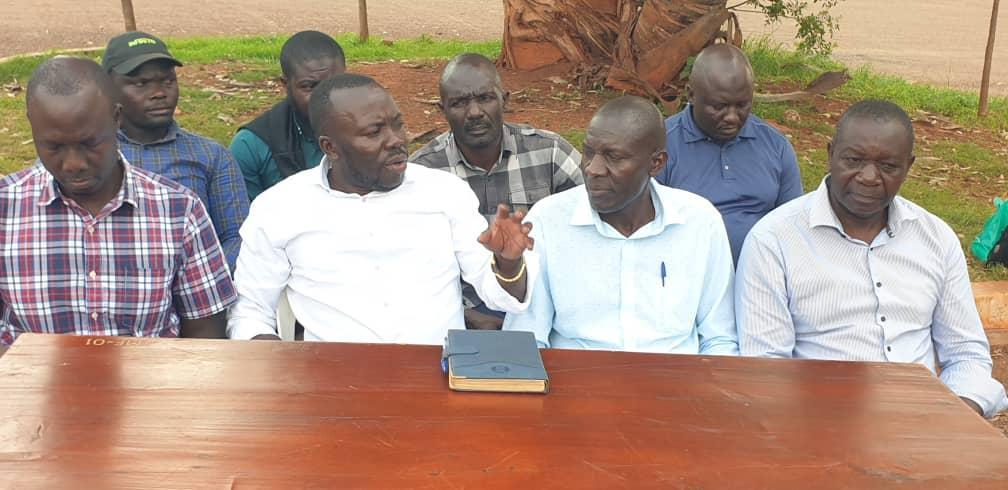Africa-Press – Uganda. Sugarcane farmers and small-scale millers under the Millers Association of Sugarcane (MAS) have protested what they describe as unfair exclusion from the newly constituted Uganda Sugar Industry Stakeholders Council.
They are accusing the Ministry of Trade, Industry and Cooperatives of sidelining their nominees in favor of politically aligned individuals and big millers.
Busoga subregion—Uganda’s leading sugarcane growing area and home to seven sugar mills—has been at the center of the row, with farmers and millers insisting that their voices are being silenced in a sector where they contribute the most.
The row stems from a letter dated June 16, 2025, in which Trade Minister Francis Mwebesa wrote to sugarcane farmers, the Uganda Sugar Manufacturers Association (USMA), and MAS, asking them to nominate representatives to the new Council following the President’s assent to the Sugar Amendment Act 2025.
The Act provides for a nine-member Council composed of three farmer representatives, three miller representatives, and three government officials. The law further stipulates that farmer and miller nominees must be drawn from sugarcane catchment areas across the country.
In his letter, Minister Mwebesa directed stakeholders to hold consultations and submit names of their chosen representatives by July 16, 2025, attaching CVs and official resolutions.
However, stakeholders from Busoga say their nominees were ignored.
According to Lazarus Namadu, a sugarcane farmer from Jinja, farmers held a consultative meeting and nominated Isa Budhugo as their representative, only for his name to be dropped “under unclear circumstances.”
“We were shocked to learn that the name we sent to the Minister was rejected, and instead someone from a newly created farmers’ group—the Greater Busoga Sugarcane Farmers Union—was appointed. This is politically motivated and that representative will not serve our interests,” Namadu said.
Millers under MAS, which includes GM Sugar, Kamuli Sugar, Mayuge Sugar, and Victoria Sugar among others say they too were excluded.
According to George Bamwine, MAS spokesperson, all nominees submitted by small and medium millers were rejected in favor of those fronted by large-scale players such as Kakira Sugar, SCOUL, and Kinyara Sugar Ltd.
“This is unacceptable. The Sugar Council was meant to represent all stakeholders, but it has been hijacked by a few big players. Small millers also deserve representation,” Bamwine argued.
The Ministry of Trade, however, insists the council is not yet constituted.
Ministry spokesperson Khadija Nakakande downplayed the fears of farmers and millers, urging them to wait until the process is complete.
“It is true different stakeholders submitted nominees, but the process of constituting the Sugar Council is still ongoing. The Council is not yet in place, so let’s be patient,” Nakakande said.
Her views were echoed by Jim Kabeho, Chairperson of USMA, who said: “I will not comment on rumors. As far as I know, the process is still underway, so people should wait before complaining.”
But disgruntled stakeholders warn they will have little recourse once Cabinet approves the Council. They are now calling on Busoga ministers to block the approval of what they describe as a “biased Council.”
“We call upon Ministers Fred Bwino Kyakulaga, Persis Namuganza, Justine Lumumba, Lukia Nakadama, Fredrick Ngobi Gume among should stand firm and defend our stand” Isa Budhugo said
“The president knows sugarcane is the lifeline of Busoga. If he fails to intervene, he knows what we can do on the ballot,” warned Mukama Ndonte, a farmer from Mayuge.
Stakeholders are urging Cabinet to compel Minister Mwebesa to revisit the selection process and consider their nominees before any final decision is taken.
The Sugar Amendment Act 2025 was passed to strengthen regulation and coordination of Uganda’s sugar industry, but the current standoff signals deepening divisions between smallholders and the dominant millers—a rift that could reshape the politics and economics of Uganda’s sugar belt.
For More News And Analysis About Uganda Follow Africa-Press






